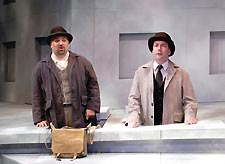To Be or Not To Be
'Rosencrantz and Guildenstern' may be dead, but they're also very much alive in Studio's engaging and cohesive production
It says so much about Tom Stoppard that he can write such a fun, irreverent and wit-packed play as Rosencrantz and Guildenstern are Dead and still have as the major theme the certainty of death. Even better is his ability to weave this raw riff so deviously into the text that we are fooled again and again. One minute we are chuckling away at some explosive banter and the next we are all staring into the abyss. Then some clever sleight of hand distracts us again, before suddenly a skull somehow appears on stage.
And yet on top of all this, Stoppard is subtly drawing us in even further — as Rosencrantz and Guildenstern become our narrative anchors, they also become our communal conscious. Their thoughts on death, their insights and angles, stimulate our own. By the time Rosencrantz and Guildenstern actually meet their deaths, we have grown uncomfortably close.
 |
And as the title suggests, Stoppard chose to deliver his study on the Exit Door using the two ill-fated messengers from Shakespeare’s Hamlet. His wit in choosing these two particular characters lies in their original inconsequence in Hamlet; indeed they eventually die off-stage with barely a mention. There is something very satisfying about taking two such minor characters from one of the greatest plays and making them the center of their own universe. It creates a pure fiction within a fiction and it is a perfect breeding ground for irreverent fun laced with existentialism.
Director Kirk Jackson has a real handle on this idea and he has been clever enough to give this production a major strength: He has fostered excellent cohesion in his troupe. It is evident in the ease among the actors, the ease of transitions, and most crucially, the shared vision. These actors are fully simpatico with each other and with the play and, despite a few rough areas; it makes for a magical, lasting impact.
The two leads, Liam Craig as Guildenstern and Raymond Bokhour as Rosencrantz, are lucky to share in this power of the ensemble. In the entire context of the play, both do an admirable job, but as a duo, their scenes sometimes have a tendency to drag. Both have charisma, but grabbing the audience’s attention isn’t always enough. Certainly, it cannot be easy to pace the many Waiting for Godot-style moments here. Stoppard is showing us these two creatures that move all over the stage, talking and talking, but going nowhere. It is an essential part of the study on death coming to all (and other thesis-worthy issues), but sometimes less is more. The eye simply tires, tires terribly, of the two men going up and down the set ad nauseam. It’s a dilemma. They are embodying their existential angst, but it gets awfully annoying to watch.
Rosencrantz is the idiot savant here, Guildenstern the straight man, but in these long periods of inaction, they don’t seem aware of how magnified every expression becomes to the audience. There are times when we get a bit too close to Abbott and Costello Meet the Grim Reaper for comfort. Less flapping and eye-bulging would help.
And though much of the repartee flows nicely, some of the line deliveries could use more punch, some of the banter should be slower — even by a second or two — just enough time to allow us to hear the built-in emphasis. Catching the British rhythms is hard for Americans, but it can be done.
| Rosencrantz and Guildenstern Are Dead To June 24 Studio Theatre 1501 14th St. NW $34-$55 202-332-3300 www.studiotheatre.org |
There is a more experienced actor here who does ”get” the writer’s voice: Floyd King as The Player. Leading a band of young derelicts, King plays their world-weary but world-wary director. He is virtually radioactive with the very brand of irony Stoppard deserves and consequently King’s every line is priceless. He plays it down and down and down until he pops it right over the top. He is absolutely riveting. His band of boys manage their complex choreography, mime and characterizations brilliantly. One gets the feeling he provided them some guidance in real life as well as in character.
The rest of the cast come and go, usually at speed, filling us in with the Hamlet narrative. Although the deliveries vary in effectiveness, with Jackson’s close attention to cohesion, the stronger carry the weaker.
So this is a play about death, meaning and time (among other things to numerous to mention), but it is filled to the brim with uproarious banter, word wars and the best kind of irreverence (much of it toward the acting profession). It is not at all gloomy, but neither is it hopeful — a perfect antidote to these saccharine times.
Support Metro Weekly’s Journalism
These are challenging times for news organizations. And yet it’s crucial we stay active and provide vital resources and information to both our local readers and the world. So won’t you please take a moment and consider supporting Metro Weekly with a membership? For as little as $5 a month, you can help ensure Metro Weekly magazine and MetroWeekly.com remain free, viable resources as we provide the best, most diverse, culturally-resonant LGBTQ coverage in both the D.C. region and around the world. Memberships come with exclusive perks and discounts, your own personal digital delivery of each week’s magazine (and an archive), access to our Member's Lounge when it launches this fall, and exclusive members-only items like Metro Weekly Membership Mugs and Tote Bags! Check out all our membership levels here and please join us today!























